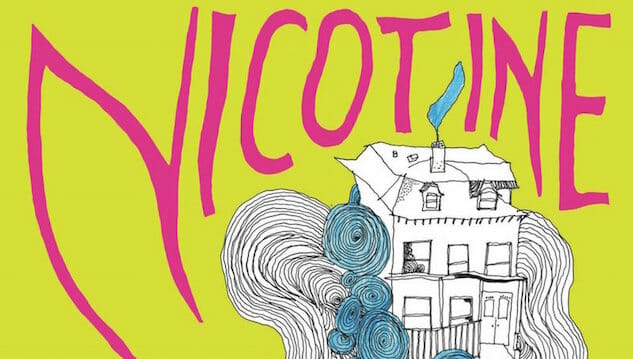Nell Zink Populates Her Pages with Enthralling Anarchists in Nicotine

John Irving once described himself as “more wrestler than writer.” He wasn’t so much affirming his lifelong allegiance to a favorite sport as suggesting that, in his five decades as a novelist, he has compensated for a lack of virtuosity through discipline, mental agility and a practiced ability to penetrate language’s defenses. Though Irving is probably underestimating his considerable gifts as a storyteller, he’s never made the novelist’s craft look as easy as other writers in his literary weight class. Any novelist who needs to know not only how his story ends but the precise wording of its last sentence before he can write anything else is probably cursed to wrestle with writing to the bitter end.
Nell Zink’s gift for revealing character through unsettling and comic sexual situations in taut prose evokes Irving’s two pre-Garp minor masterpieces, The 158-Pound Marriage and The Water-Method Man. Her new novel, Nicotine, like Irving’s latest, coincidentally begins with an adolescent orphan living in a Latin American garbage dump. But the similarities end there, by all appearances, which would seem to cast Irving and Zink on opposite sides of the wrestler-virtuoso divide. Nicotine and Zink’s breakthrough novel, Mislaid, may indeed have been composed with as much applied method and dogged determination as Irving’s. But something in the onward rush and the effortless elegance of Zink’s fast-flowing prose suggest that these stories come to her fully formed and emerge as fast as she can type them. As the cleverly plotted Mislaid unfolds with entrancing unpredictability, Zink makes it look so easy you can imagine she’s as surprised as you are by where the story goes.
 Structurally looser and less linear than Mislaid, Nicotine’s action swirls around the heirs and real estate holdings of hippie shaman Norm Baker, who dies following a protracted hospice stay early on in the book. Nicotine mostly follows the adventures of Norm’s 23-ish, recently MBA’d daughter Penny as she attempts to restart her life after her father’s drawn-out death throes. Entrusted by her detached South American mother and her cynical half-brothers to restore the derelict Jersey City house where her father grew up, Penny stumbles into the peculiar demimonde of North Jersey anarchist squatters, loosely affiliated in a network of co-op houses known as Community Housing Action (CHA).
Structurally looser and less linear than Mislaid, Nicotine’s action swirls around the heirs and real estate holdings of hippie shaman Norm Baker, who dies following a protracted hospice stay early on in the book. Nicotine mostly follows the adventures of Norm’s 23-ish, recently MBA’d daughter Penny as she attempts to restart her life after her father’s drawn-out death throes. Entrusted by her detached South American mother and her cynical half-brothers to restore the derelict Jersey City house where her father grew up, Penny stumbles into the peculiar demimonde of North Jersey anarchist squatters, loosely affiliated in a network of co-op houses known as Community Housing Action (CHA).
The one prerequisite for residency in these houses—including her grandparents’ abandoned house, dubbed “Nicotine” after the tobacco consumers who live there—is that the co-op members practice activism as their primary occupation. But Penny finds little in the way of wide-eyed idealism or passionate political commitment among the CHA squatters she encounters, though most like to argue and invent hashtags. As the first Nicotine resident Penny meets explains, “The houses all have themes. Some are pretty trivial—bicycle activists like me, tree tenders, you know, small-time BS—and some are big mainstream political issues like environmental stuff, different health issues, AIDS and TB and whatever.”
Penny meets an assortment of intriguing characters: a mysteriously asexual bicycle mechanic named Rob who has provisionally fixed the house’s burned-out roof; a chubby, clinically depressed woman named Sorry whose chain-smoking keeps her precarious health in balance; and a self-scarring, uncannily erotic Kurdish-American poet named Jazz who lives in Nicotine’s rooftop greenhouse. Short on big-issue activism but long on identity politics and ostracized-smoker indignation, Nicotine’s residents take to Penny immediately. They draw her into the CHA world, and their instant camaraderie inspires her to delay her plans to kick out the squatters, though her unsentimental mother and her industrialist older brother have other ideas.
-

-

-

-

-

-

-

-

-

-

-

-

-

-

-

-

-

-

-

-

-

-

-

-

-

-

-

-

-

-

-

-

-

-

-

-

-

-

-

-








































